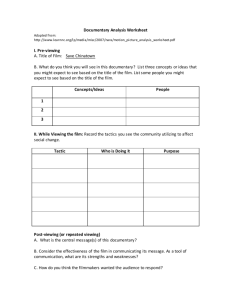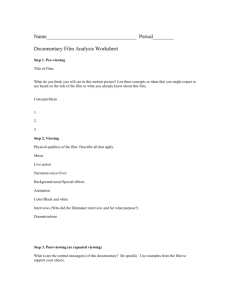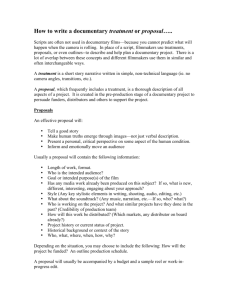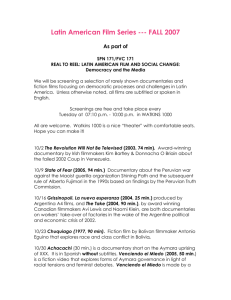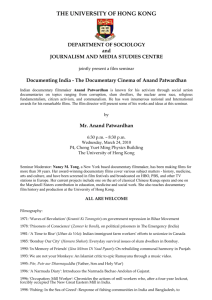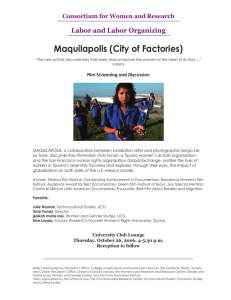Video Catalog - UTSA College of Education
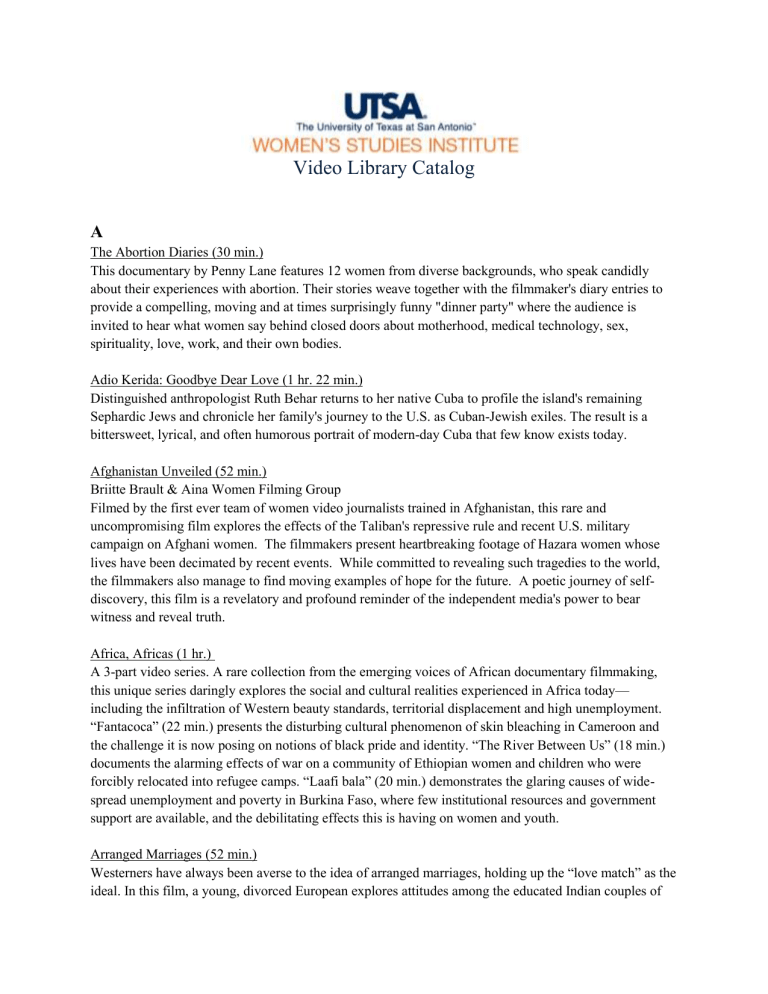
Video Library Catalog
A
The Abortion Diaries (30 min.)
This documentary by Penny Lane features 12 women from diverse backgrounds, who speak candidly about their experiences with abortion. Their stories weave together with the filmmaker's diary entries to provide a compelling, moving and at times surprisingly funny "dinner party" where the audience is invited to hear what women say behind closed doors about motherhood, medical technology, sex, spirituality, love, work, and their own bodies.
Adio Kerida: Goodbye Dear Love (1 hr. 22 min.)
Distinguished anthropologist Ruth Behar returns to her native Cuba to profile the island's remaining
Sephardic Jews and chronicle her family's journey to the U.S. as Cuban-Jewish exiles. The result is a bittersweet, lyrical, and often humorous portrait of modern-day Cuba that few know exists today.
Afghanistan Unveiled (52 min.)
Briitte Brault & Aina Women Filming Group
Filmed by the first ever team of women video journalists trained in Afghanistan, this rare and uncompromising film explores the effects of the Taliban's repressive rule and recent U.S. military campaign on Afghani women. The filmmakers present heartbreaking footage of Hazara women whose lives have been decimated by recent events. While committed to revealing such tragedies to the world, the filmmakers also manage to find moving examples of hope for the future. A poetic journey of selfdiscovery, this film is a revelatory and profound reminder of the independent media's power to bear witness and reveal truth.
Africa, Africas (1 hr.)
A 3-part video series. A rare collection from the emerging voices of African documentary filmmaking, this unique series daringly explores the social and cultural realities experienced in Africa today— including the infiltration of Western beauty standards, territorial displacement and high unemployment.
“Fantacoca” (22 min.) presents the disturbing cultural phenomenon of skin bleaching in Cameroon and the challenge it is now posing on notions of black pride and identity. “The River Between Us” (18 min.) documents the alarming effects of war on a community of Ethiopian women and children who were forcibly relocated into refugee camps. “Laafi bala” (20 min.) demonstrates the glaring causes of widespread unemployment and poverty in Burkina Faso, where few institutional resources and government support are available, and the debilitating effects this is having on women and youth.
Arranged Marriages (52 min.)
Westerners have always been averse to the idea of arranged marriages, holding up the “love match” as the ideal. In this film, a young, divorced European explores attitudes among the educated Indian couples of
her acquaintance, asking them how they met and married their spouses. What emerges is an engaging portrait of young marrieds who have striven for personal happiness within a social system which would seem to negate these considerations.
B
Bastard Out of Carolina (1 hr. 41 min.)
Anney Boatwright (Jennifer Jason Leigh), young and single, gives birth to a daughter - an illegitimate child - nicknamed "Bone" because her Uncle Earl (Michael Rooker) says, "She ain't no bigger than a knucklebone." Although she grows up poor in 1950s South Carolina, Bone (Jena Malone) and her mother enjoy a deep and loving relationship; however, Daddy Glen (Ron Eldard), Anney's new husband, becomes jealous of the powerful bond they share. bell hooks: Cultural Criticism & Transformation (1 hr. 6 min.) bell hooks makes a compelling argument for the transformative power of cultural criticism. She demonstrates how learning to think critically was central to her own self-transformation and how it can play a role in students' quest for a sense of agency and identity.
Bordertown (1 hr. 54 mins.)
A powerful story of life on the border between the United States and Mexico, Bordertown is based on the hundreds of women working in American-owned factories who have been brutally raped and murdered in
Juarez, a city gripped by fear. The attacks have been covered up by the local authorities, and still continue today.
C
A Crushing Love: Chicanas, Motherhood and Activism (1 hr. 39 min.)
A CRUSHING LOVE Chicanas, Motherhood and Activism: A film by Sylvia Morales 2009, 58 minutes,
Color, DVD Order No. W10977 A CRUSHING LOVE, Sylvia Morales’ sequel to her groundbreaking history of Chicana women, CHICANA (1979), honors the achievements of five activist Latinas—labor organizer/farm worker leader Dolores Huerta, author/educator Elizabeth “Betita” Martinez, writer/playwright/educator Cherrie Moraga, civil rights advocate Alicia Escalante, and historian/writer
Martha Cotera—and considers how these single mothers managed to be parents and effect broad-based social change. Both the activists, thoughtfully explore the challenges, adaptations, rewards, and missteps involved in juggling these dual roles.
Carmen (1 hr. 39 min.)
Carlos Saura Dance 4 Trilogy Part 1
CARMEN, the second in Carlos Saura's flamenco dance trilogy, which also includes BLOOD
WEDDING and EL AMOR BRUJO, is staged as an opera within an opera. To counter what many
Spaniards feel are the ineffectual cliché and cultural trappings of CARMEN--the fans and knives and the roses between the teeth--Saura and dancer-choreographer Antonio Gades have integrated into the original story a parallel subplot about love, jealousy, and violence in the lives of the dancers performing the ballet.
This contemporary love affair between Antonio (Antonio Gades) and Carmen (Laura del Sol) clearly follows the plot of the opera. The entire subplot takes place in rehearsals, and includes a delightful scene of the entire troop spontaneously bursting into a parody of the campy March of the Toreadors.
Century of Genocide in the Americas: The Residential School Experience (17 min.)
A short but powerful documentary about how Indian Residential Schools became a haven for institutionalized sexual abuse. The inspiration for the film comes from the First nations survivors who have taken legal action against the institutions that perpetuated this destructive cycle; these are the very same institutions whose purpose and mandate was to “provide” for their well being. This video takes a historical look at how the systematic removal of First Nations children from their families and community not only made them easy targets for pedophiles but also how these vile acts turned many of the victims into predators. The second half shows First Nations peoples taking legal action against not only the pedophiles, but also against the Canadian government and churches while at the same time using their traditional ways of healing in order to bring back joy and balance back within their own lives and also within their communities.
The Clitoris: Forbidden Pleasure (1 hr.)
This provocative and often humorous documentary explores the "mysteries" of female sexuality, focusing on the clitoris; a tiny, highly sensitive organ with 8,000 nerve endings at its tip, making it the most responsive organ in the human body, including the tongue or, in men, the penis. In THE CLITORIS interviews with doctors, psychologists, writers, therapists, and sex educators are interwoven with graphic imagery, animation, hilarious TV commercials to examine both historical and contemporary perceptions of the psychology and physiology of women's sexual response.
The Color Purple (2 hr. 34 min.)
Based on Alice Walker's Pulitzer Prize-winning novel, The Color Purple is the richly-textured, decadesspanning story of Celie, an uneducated woman living in the rural American South. Forced to marry a brutal man she calls "Mr.," Celie turns inward and shares her grief only with God. But she is transformed by the friendship of two remarkable women, acquiring self-worth ... and the strength to forgive.
The Color Purple: Inside a Modern American Classic (1 hr. 2 min.)
This masterfully filmed interview with the Pulitzer Prize-winning author juxtaposes her comments and literary recitations with dramatic interpretations from Steven Spielberg's film. Walker reveals the characters as actual people from her childhood. Describing the work as honoring the dignity of all people, especially black women, Walker offers the novel as an example of the power of art as a weapon against racism and sexism. The importance of interpreting literary tradition in the context of history and culture is examined. Director Steven Spielberg is also interviewed. A BBC Production.
Cut From Different Cloth: Burqas & Beliefs (56:40 min.)
In 2005 filmmakers Cliff Orloff and Olga Shalygin returned to Afghanistan's northern city of Mazar-i-
Sharif for the third time since the fall of the Taliban in 2002. Despite a growing network of Afghan friends and colleagues from their two prior visits, they had been restricted in their ability to meet freely with Afghan women. The all-covering burqa, the high-walled living compounds and cultural restrictions on women limited their access. Olga, a Pulitzer Prize winning photojournalist, was puzzled why virtually all the Afghan women she saw still wore the burqa...even though a new constitution was adopted that granted women equal rights with men, and security had greatly improved. This time, Olga brought
Serena, her 27-year-old stepdaughter. Serena lived for a month as an Afghan with Hasina, a 27-year-old
Afghan woman, and her family. Serena became the eyes and ears of the filmmakers. Together, Hasina,
Serena and Olga set out on a journey to learn what it means to be a woman in today's Afghanistan. In the process they confront their own conflicts with the culture and traditions. Serena comes to understand the risks Hasina and other Afghan women take to assert their rights.
A Conversation with Academics about Selena (60 min.)
Five unidentified women discuss the pop singer Selena's life, the influence she had on Chicano teenage girls, and the events that led to her murder.
D
Danzón (1 hr. 43 min.)
A film festival winner and critical favorite, Danzón is a surprising love story about a woman who finally discovers the passion that has been missing from her life. Maria Rojo, in an award-winning performance, stars as Julia, a Mexico City telephone operator whose tame, predictable life is enlivened only by the ballroom dancing she enjoys each week. When her dance partner, Carmelo, suddenly disappears, Julia stuns her friends by impulsively following his trail to Vera Cruz. Carmelo, about whom she knows little, comes to symbolize all that is missing in Julia's life: passion, romance, mystery. And her search for him holds all that and more, as this enchanting journey shakes Julia's ideas about life and offers a new definition of love.
Daughters of the Dust (1 hr. 53 min.)
The sensitive story of a large African-American family leaving their Gullah Island homeland for the promise of a new and better future, and the fears and changes they confront along the way. As they celebrate this one last day of togetherness at a picnic, Nana Peazant, the family's matriarch who has chosen to stay behind, tells stories of their African ancestors and the arrival of slaves on the American shores. By exhorting her loved ones never to forget this past, she tries to assure their future strength -- which must always come from a respect for oneself and one's history.
The Day I Became a Woman (1 hr. 18 min.)
Languages: Farsi (with English subtitles)
"One is not born, but rather becomes a woman." Simone De Beauvoir's exquisite pronouncement on the social construction of gender in her Second Sex (1949) spoke to generations of women, and of a universal truth beyond countries and cultures. As an example of astonishing visual poignancy, The Day I Became a
Woman is the globally celebrated debut of Marziyeh Meshkini, a young Iranian filmmaker bringing her rich and diversified national cinema to bear on an enduring global concern, in a new crescendo of memorable subtlety and grace. "The Day" is repeated in three consecutive episodes-the memorial registers of childhood, adolescence, and old age-when three stages of "becoming" a woman is culturally manufactured and socially registered. Between Simone De Beauvoir and Marziyeh Meshkini, generations of women (and men), from all cultures around the world, will have much to learn and even more to achieve.
Deadly Persuasion: The Advertising of Alcohol & Tobacco (1 hr.)
An exposure of the manipulative marketing strategies and tactics used by the alcohol and tobacco industries.
Diverted to Delhi (55 min.)
This film explores a new phenomenon in the global economy. The toll-free telephone numbers used to place orders or get information are often answered thousands of miles away, by Indians impersonating local operators. Whether a New Yorker calls may be re-routed, answered by Indians trained to speak and even think like Americans, or Brits or Australians.
E
Elisabeth Kübler-Ross Facing Death (57 min.)
Conversations with Elisabeth Kübler-Ross in Arizona form the core of the film. She looks back on her life, describes her childhood and her work, and explains how she herself faces aging and impending death.
Edge of America (1 hr. 46 min.)
When new man in town Kenny Williams (James McDaniel), takes a new job as an English teacher at the
Three Nations Reservation in Utah, he finds it difficult to fit in with the close-knit Native American community. But by taking on the challenge of coaching the women's high school basketball team, both the girls and he learn what it takes to finally believe in themselves and in others.
The Edge of Each Other's Battles: The Vision of Audre Lorde (59 min.)
This documentary is a tribute to legendary black lesbian feminist poet Audre Lorde. It includes footage of the inimitable Lorde herself, and candid interviews with “I Am Your Sister Conference” organizers. The Edge of Each Other's Battles powerfully brings Lorde's legacy of poetry and politics to life and conveys the spirit, passion and intensity that remains her trademark.
Escuela (53 minutes)
There are over 800,000 students enrolled in migrant education programs in the U.S. and, of those, only
45-50% ever finish high school. Escuela, the sequel to Hannah Weyer's critically acclaimed documentary La Boda , personalizes these glowing statistics through the honest portrait of a teenage
Mexican-American farm worker, Liliana Luis.
F
The F-Word: A Video About Feminism (10 min.)
The F-Word is a provocative look at the power of the word ‘feminism' in the U.S. Designed to open up attitudes, The F-Word proves feminism is still something worth talking about—hotly debated, widely misconstrued, but undeniably a fact of life!
The Fragile Promise of Choice: Abortion in the US Today (57 min.)
Vignettes from around the country, news footage, and interviews combine to show how restrictive legislation, funding cutbacks, and anti-choice violence affect abortions availability and how activists and clinicians are working to preserve abortion access.
From Danger To Dignity: The Fight for Safe Abortion (57 min.)
The national movement to decriminalize abortion is traced through the illegal networks that helped women to find safe abortions and the efforts of activists and legislators to change the law.
From One Prison (1 hr. 10 min.)
Told through the voices of four women serving life or long-term prison sentences for fighting back in self-defense against their abusive husbands or lovers, From One Prison exposes a legal system that blatantly discriminates against women, punishing them and silencing them through indifference and aggressive cruelty. Shot within the prison itself, this intimate and powerful documentary presents women who are both articulate and dignified as they describe survival issues that extend from the domestic to the criminal justice spheres.
G
Getting Where We've Got To Be: Women in the Texas Legislature (38 min.)
This video analyzes why so few women have served in the Texas legislature and explains how women have increased their participation since the 1970s. Based on interviews and archival research, the film shows how women campaigned for office, examines the strategies they used to pass legislation, explores the tensions between political and private life, and offers advice for youth considering careers in public service.
The Greatest Silence (76 min.)
Since 1998 a brutal war has been raging in the Democratic Republic of Congo (DRC). Over 4 million people have died. And there are the uncountable casualties: the many tens of thousands of women and girls who have been systematically kidnapped, raped, mutilated and tortured by soldiers from both foreign militias and the Congolese army. The world knows nothing of these women. Their stories have never been told. They suffer and die in silence. In The Greatest Silence: Rape in the Congo these brave women finally speak.
H
A Healthy Baby Girl (57 min.)
In 1963 filmmaker Judith Helfand's mother was prescribed the ineffective, carcinogenic synthetic hormone diethylstilbestrol (DES), meant to prevent miscarriage and ensure a healthy baby. At twentyfive, Judith was diagnosed with DES-related cervical cancer. Shot over five years, A Healthy Baby
Girl tells a story of survival, mother-daughter love, family renewal, and community activism. It is an invaluable resource for anyone interested in the relationship between women's health, public policy, medical ethics and corporate responsibility.
Heart of the Sea (57 min.)
The film is the inspiring portrait of surf legend Rell "Kapolioka'ehuk” Sunn, founding member of the
Women's Professional Surfing Association and one of Hawaii's most beloved community leaders. While known for her incredible physical power, grace and luminous beauty, it was her generous spirit and relentless work as a youth, environmental and breast cancer activist that made her an icon on the Islands.
Sunn tragically discovered she had breast cancer at the age of 32. Despite the diagnosis, she continued surfing and promoting breast cancer awareness among native Hawaiian and Pacific Islander women until her final days.
Hour of the Star (96 min.)
Narrated by the cosmopolitan Rodrigo S.M., this brief, strange, and haunting tale is the story of Macabéa, one of life's unfortunates. Living in the slums of Rio and eking out a poor living as a typist, Macabéa loves movies, Coca-Colas, and her rat of a boyfriend; she would like to be like Marilyn Monroe, but she is ugly, underfed, sickly and unloved. Rodrigo recoils from her wretchedness, and yet he cannot avoid the realization that for all her outward misery, Macabéa is inwardly free/She doesn't seem to know how unhappy she should be. Lispector employs her pathetic heroine against her urbane, empty narrator—edge of despair to edge of despair—and, working them like a pair of scissors, she cuts away the reader's preconceived notions about poverty, identity, love and the art of fiction. In her last book she takes readers close to the true mystery of life and leave us deep in Lispector territory indeed.
I
I am Women: VOICES OF POWER (29 min.)
African-American women have captured the moral imagination of mainstream American through their essay, novels, poetry, and other artistic endeavors, breaching the static lines of race, gender, and class.
How have their reflection so clearly articulated the hopes and philosophies of so many?
Ida B. Wells: A Passion for Justice (53 min.)
Though virtually forgotten today, Ida B. Wells-Barnett was a household name in Black America during much of her lifetime (1863-1931) and was considered the equal of her well-known African American contemporaries such as Booker T. Washington and W.E.B. Du Bois. This film documents the dramatic life and turbulent times of the pioneering African American journalist, activist, suffragist and antilynching crusader of the post-Reconstruction period.
IDAHO'S FORGOTTEN WAR (75 min.)
Idaho’s Forgotten War(2008) addresses tribal sovereignty, culture and traditions. Director, Sonya
Rosario, focuses on the powerful leadership of Amy Trice and the Kootenai Tribe who in 1974, led the
Kootenai people to face down the US Government by declaring war as a Sovereign Nation, and begin their journey back to reclaim their human and land rights. Q&A with director following screening.
I am Women: IS FEMINISM DEAD? (29 min.)
Years after the women's movement burst open doors of opportunity that had long been barred, a new generation of women seems to be questioning the meaning and the value of the battles fought by their mothers and grandmothers. Has feminism somehow gone out of style?
The Idea We Live In (19 min.)
How does space, specifically our family home, affect us and our idea of who we are? The script for this beautiful and poetic videotape began as a collage of poetry and texts by diverse authors such as Jaime
Abines, Marge Piercy, Gaston Bachelard, and Pilar Rodriguez herself. It became a narrative about a woman going inside the home of her memories and desires. The film eloquently explores the concept of
‘home' as a metaphor for understanding cultural identity.
I Had an Abortion (55 min.)
Gillian Aldrich & Jennifer Baumgardner
Underneath the din of politicians posturing about "life" and "choice," beyond activists yelling about
murder and rights, there are stories of women who have had abortions. This documentary features 10 women, ages 21 to 58, telling their abortion experience.
Interactive video for Gender II (45 min.)
Allyn & Bacon
In Whose Honor? American Indian Mascots in Sports (46 min.)
Jay Rosenstein
“In Whose Honor?” takes a critical look at the long-running practice of “honoring” American Indians by using them as mascots and nicknames in sports. It follows the remarkable story of Charlene Teters
(Spokane) and her transformation from a graduate student into a national movement leader. “In Whose
Honor?” examines the issues of race, stereotypes, minority representation and the powerful effects of mass-media imagery, and also shows the extent to which one community will go to defend and justify its mascot.
Iron Jawed Angels (2 hr. 4 min.)
Taking a fresh and contemporary look at a pivotal event in American history, IRON JAWED ANGELS tells the true story of how defiant and brilliant young activists Alice Paul and Lucy Burns took the women's suffrage movement by storm, putting their lives at risk to help American Women win the right to vote.
J
K
Killing Us Softly 3 (34 min.)
Advertising's Image of Women
A review of how the image of women in advertising has changed over the last 20 years.
L
A Litany for Survival: The Life and Work of Audre Lorde (60 min.) by Ada Gay Griffin and Michelle Parkerson
An epic portrait of the eloquent, award-winning, Black, lesbian, poet, mother, teacher, and activist, Audre
Lorde, whose writing - spanning five decades - articulated some of the most important social and political visions of the 20th century.
Love and Diane (2 hr. 35 min.)
Jennifer Dworkins' groundbreaking documentary presents a searingly honest and moving examination of poverty, welfare and drug rehabilitation in the U.S. today. Filmed in New York over a five-year period,
Dworkin documents the struggles of three generations of the Hazzard family as they face a myriad of emotional, financial and personal challenges. While caught in a devastating cycle of teen pregnancy and the bureaucracy of an overburdened welfare system, they demonstrate an inspiring resiliency and ability to find strength during the most desperate times. Without falling into stereotypes of welfare and poverty, the film casts a fair, non-judgmental eye on the Hazzards and presents a forgotten, but very real side of the American experience.
M
Maid In America (57 min.)
A documentary about the Latinas who clean your homes and help raise your children...
4 years in the making, MAID IN AMERICA is a one-hour documentary which explores in an intimate way the lives of 3 Latina immigrant women who work as nannies and housekeepers in Los Angeles, CA.
Through these women's lives we'll explore the globalization of motherhood, the challenges they face while in pursuit of the American dream and the significant role they play in American households today.
Maquilapolis: City of Factories (68 min.)
The filmmakers gave several women workers in Tijuana video cameras to make a record of their lives, giving the documentary the intimate feel of video diaries.
March for Women's Lives: March for Freedom of Choice
Organize March video presentations to educate and mobilize your community to participate in the March for Freedom of Choice.
The Motherhood Manifesto: A Documentary By Laura Pacheco & John de Graaf (57 min.)
Moving personal stories combined with humorous animation, expert commentary and hilarious old film clips tell the tale of what happens to working mothers and families in America. See how enlightened employers and public policy can make paid family leave, flexible working hours, part-time parity, universal healthcare, excellent childcare, afterschool programs and realistic living wages a reality for
American families.
My Feminism (55 min.)
This superbly shot and emotionally compelling primer debunks mass media's demonization of feminism.
In incisive interviews with leading activists and intellectuals, including bell hooks, Gloria Steinem, and
Urvsaki Vaid, this powerful film insists that feminism is one of the most successful and significant revolutions of the late 20 th century.
My Mother India (52 min.)
It is no wonder that Sfina Uberoi made a film about her family. She has an Indian father who collects kitsch calendars, an Australian mother who hands her knickers out to dry in front of the horrified Indian neighbors, a grandfather who was a self-styled Guru and a fiercely man-hating grandmother. What begins as a quirky and humorous documentary about an eccentric, multicultural upbringing unfolds into a complex commentary on the social, political and religious events of the anti-Sikh riots in 1984 which tore this family apart. This is a powerful tale of love and hate, exile and belonging, loss of identity and return to faith.
N
Naturally Native (1hr. 48 min.)
Naturally Native follows the lives, loves, pain, joy and relationships of three sisters as they attempt to start their own business. Of American Indian ancestry, but adopted by a Caucasian foster mother as young children, each sister has her own identity issues and each has chosen a very different career path.
Now dedicated to starting a Native cosmetic business, they attempt to overcome obstacles both in the
business wordld and in the home. A touching love story of family and culture, Naturally Native also interweaves a subtle but strong wake-up call regarding the treatment of Native people in corporate
America.
NO!: Confronting Sexual Assault in Our Community (1 hr. 34 min.)
NO! provides a comprehensive lens through which to examine the impact of sexual violence on Black women and girls--calling to task in particular the behaviors and attitudes of Black men reinforcing a cultural assault. NO! can be used to facilitate important conversations and to support young women and men regardless of race as they learn to negotiate the challenging terrain of sexuality--without violence.
Nokomis : Voices of Anishinabe Grandmothers (54 min.)
Native American resistance to cultural genocide has continued for over 500 years. In the spirit of resistance, three Anishabe grandmothers from Minnesota and Wisconsin share their deeply personal life histories, their respective journeys of cultural reclamation, and their vision of future generations which has led to their activism. We join these wonderful women as they fight for treaty rights and the repatriation of sacred items from museums, are arrested over fishing rights, begin wearing their traditional moccasins, and continue the traditions of their grandmothers.
O
1 On 1 (25 min.)
Deborah Tannen
A sit down interview with Deborah Tannen in which Tannen explains the academic sources she draws on in her research, and addresses the most critical questions concerning language, meaning, and her analysis of conversational style.
La Operacion (40 min.)
Puerto Rico has the highest incidence of female sterilization in the world. Over one-third of all Puerto
Rican women of childbearing age have been sterilized. So common is the operation that it is simply known as ‘la operacion.' Using newsreels and excerpts from government propaganda films, plus interviews with Puerto Rican women, doctors, birth control specialists and politicians, this film explores the controversial use of sterilization as a means of population control.
P
Paulina (1 hr. 30 min.)
In the 1950s, when Paulina was a child in a rural Mexican village, her parents traded her away for land rights. The villagers ostracized her and the town boss raped her, keeping her as his unwilling mistress throughout much of her adolescence. At 15, she took control of her destiny and escaped to Mexico City to begin a new life.
Now middle-aged, Paulina returns to her village to confront her family about what happened and encounters a web of intrigue and denial. Paulina interweaves documentary and fiction styles to explore the characters' radically different perspectives and memories of this vital, resilient woman.
The Pill (45 min.)
Conceived to help women control their fertility, the birth control pill was a touchstone for sexual
liberation in the 1960s and is now used by millions around the globe. This fascinating documentary, which chronicles little known chapters in the history of the oral contraceptive that changed the world, examines how far the pharmaceutical industry was willing to risk women's health to launch its magic bullet. An impressively researched story of how the Pill came to be, the film speaks directly to issues of patients rights, medical ethics, and women's health care that still resonate today.
Playing Unfair (30 min.)
The Media Image of the Female Athlete
The first video to critically examine the post-Tile IX media landscape in terms of the representation of female athletes.
Purity (1 hr. 3 min.)
Israeli filmmaker Anat Zuria examines the Tharat Hamishpaha (family purity), the ancient laws and rituals shaping women's lives and sexuality within Jewish Orthodoxy. Giving new insight into a guarded religious community, Zuria presents her own experiences adhering to Orthodox practices, as well as those of her friends Natalie, Katie and Shira. At the heart of their stories is the “nidda”- a ten to twelve day period restricting women from touching or engaging in sexual intimacy with their husbands, which culminates with a trip to the “mikve” (cleansing baths). Each woman introduces this practice through very different perspectives – one sadly leaves her marriage in protest, one attempts to work within the tradition despite the emotional and physical stress it causes, while another proudly teaches the laws to her daughter. Beautifully incorporating lyrical and meditative images with interviews, “Purity” presents the hidden struggle of religious women to maintain their cultural traditions and individual needs within the framework of strict, masculine religious law.
Q
R
Rachel's Daughters: Searching for the Causes of Breast Cancer (1 hr. 47 min.)
From the makers of the Oscar-winning In the Shadow of The Stars , this fascinating documentary follows a group of women-all breast cancer activists who are fighting or have survived the disease—who are on a personal mission to unearth the causes of breast cancer. Addressing environmental racism, inequalities in research funding, and disparities in cancer rates for women of color, they track the effects of social biases on cancer incidence and health care delivery.
Real Women Have Curves (1 hr. 26 min.)
Should she leave home, go to college and experience life? Or stay home, get married, and keep working in her sister's struggling garment factory? It may seem like an easy decision, but for 18-year-old Ana, every choice she makes this summer will change her life. At home, she is bound to a mother who wants her to become someone she's not. But at school, she's encouraged by a teacher who sees her potential, and adored by a boyfriend who loves her for who she is. Right now, Ana may be making clothes for less shapely women. But she's about to discover that real women take chances, have flaws, embrace life, and above all, have curves!
Rigoberta Menchú: Cassandra and Crusader (28 min, Spanish with English subtitles)
Rigoberta Menchú has become widely known as a leading advocate of Indian rights and ethno-cultural reconciliation-and also a center of controversy-not only in her native Guatemala, but throughout the western hemisphere. In this program, Menchú, winner of the Nobel Peace Prize R and other international awards, talks about her life both at home and in exile.
Rosita (57 min.)
ROSITA, an hour-long documentary by award-winning filmmakers Barbara Attie and Janet Goldwater, traces a young girl's journey from innocent victim to unwitting victor. When a nine-year-old Nicaraguan girl becomes pregnant as a result of a rape, her parents — illiterate campesinos working in Costa Rica
— seek a legal "therapeutic" abortion to save their only child's life. Their quest pits them against the governments of Nicaragua and Costa Rica, the medical establishment, and the Catholic Church. When their story gains international media attention the repercussions ripple across Latin America and Europe.
S
Señorita Extraviada, Missing Young Woman (1 hr. 14 min.)
The video tells the haunting story of the more than 200 kidnapped, raped and murdered young women of
Juárez, Mexico. Visually poetic, yet unflinching in its gaze, this compelling investigation unravels the layers of complicity that have allowed for the brutal murders of women living along the Mexico-U.S. border. In the midst of Juárez's international mystique and high profile job market, there exists a murky history of grossly underreported human rights abuses and violence against women. Relying on what the filmmaker comes to see as the most reliable of sources-the testimonies of the families of the victims-the video documents a two-year search for the truth in the underbelly of the new global economy.
Sexism in Language: Thief of Honor, Shaper of Lies (29 min.)
Lynn Lovdal explains examples of gender bias in everyday English in this presentation. Exposing unrecognized sexism in syntax and semantics, Lovdal illustrates female words that are dependent on male versions, words that are more positive for men than for women, words about women that carry negative sexual connotations and neutral words that become inferior when applied to women.
Stuart Hall: Representation and the Media (55 min.)
Representation and Media is an introductory lecture that unpacks one of the central ideas of cultural studies-that reality is not experienced directly, but always through the lens of culture, through the way that human beings represent and tell stories about the world in which they live.
Sisters of '77: The struggles and triumphs in the battle for equal rights (55 min.)
Films about 1977 women's conference of the National Organization for Women. At the height of "second wave" feminism, the energy and enthusiasm of the movement is clear. Many famous feminists of the
60s/70s appear and are heard in this film.
Spin the Bottle: sex, lies & alcohol (45 min.)
Spin the Bottle offers an indispensable critique of the role that contemporary popular culture plays in glamorizing excessive drinking and high-risk behaviors. Award-winning media critics Jackson Katz and
Jean Kilbourne contrast these distorted representations with the often disturbing and dangerous ways that
alcohol consumption affects the lives of real young men and women. Illustrating their analysis with numerous examples, Katz and Kilbourne decode the power and influence these seductive media images have in shaping gender identity, which is linked to the use of alcohol. Nowhere is this link more cause for concern than on America's college campuses.
Standing On My Sisters' Shoulders (60 min.)
In 1965, when three women walked into the US House of Representatives in Washington D.C., they had come a very long way. Neither lawyers nor politicians, they were ordinary women from Mississippi, and descendants of African slaves. They had come to their country's capitol seeking civil rights, the first black women to be allowed in the senate chambers in nearly 100 years. A missing chapter in our nation's record of the Civil Rights movement, this powerful documentary reveals the movement in Mississippi in the
1950's and 60's from the point of view of the courageous women who lived it—and emerged as its grassroots leaders. Their living testimony offers a window into a unique moment when the founders' promise of freedom and justice passed from rhetoric to reality for all Americans. Through moving interviews and powerful archival footage, Standing On My Sisters’ Shoulders weaves a story of commitment, passion and perseverance and tells the story of the women who fought for change in
Mississippi and altered the course of American history forever.
T
That's Not What I Meant (55 min.)
Deborah Tannen
Dr. Tannen is on the Linguistics Department faculty at Georgetown University, where she holds the distinguished rank of University Professor. She has been McGraw Distinguished Lecturer at Princeton
University, and was a fellow at the Center for Advanced study in the Behavioral Sciences in Stanford,
California, following a term in residence at the Institute for Advanced Study in Princeton, New Jersey.
She has published nineteen books and over a hundred articles and is the recipient of five honorary doctorates.
Tough Guise (1 hr. 22 min.)
Violence, Median and the Crisis in Masculinity
Educational video geared toward college and high school students to systematically examine the relationship between images of popular culture and the social construction of masculine identities in the
U.S. at the dawn of the 21 st century.
Troubled Harvest (30 min.)
This award-winning documentary examines the lives of women migrant workers from Mexico and
Central America as they work in grape, strawberry and cherry harvests in California and the Pacific
Northwest. Interviews with women farm workers reveal the dangerous effects of pesticides on their health and that of their children, the problems they encounter as working mothers of young children, and the destructive consequences of U.S. immigration policies on the unity of their families.
Two Spirits (54 min.)
Two Spirits interweaves the tragic story of a mother’s loss of her son with a revealing look at a time when the world wasn’t simply divided into male and female and many Native American cultures held places of honor for people of integrated genders.
U
Under The Skin Game (18 min.)
By Diane Nerwen. Visually and politically provocative, Under The Skin Game combines images from instructional films, 1950's melodrama, and the nightly news to show how contraceptive implant Norplant is being used as an instrument of social control. Linking Norplant's prescription by state agencies to
America's history of forced sterilizations and unethical Pill testing, Nerwen convincingly argues that a woman's right to control her reproductive destiny is still based on social status.
Up to a Certain Point (1 hr. 10 min.)
A clever, self-reflexive satire about the battle of the sexes in contemporary Cuba. The film tells the story about Oscar, an educated filmmaker that if found doing research about machismos that falls in love with
Lina, and what starts out as funny and frantic, soon turns out to put Oscar in the middle of deciding between his new lover and his wife.
V
W
Watermelon Woman (1 hr. 30 min.)
Cheryl is young, Black, and lesbian, working in Philadelphia with her best friend Tamara and consumed by a film project: to make a video about her search for a Black actress from Philly who appeared in films in the 30s and was known as the Watermelon Woman. Following various leads, Cheryl discovers the
Watermelon Woman's stage name and real name and surmises that the actress had a long affair with
Martha Page, a White woman and one of Hollywood's few female directors. As she's discovering these things, Cheryl becomes involved with Diana, who's also White. The affair strains Cheryl's friendship with
Tamara. More discoveries bring Cheryl (and us, her audience) to new realizations.
When Abortion Was Illegal: Untold Stories (28 min.)
Women who risked their lives and doctors who risked their licenses speak frankly to bring alive the era of back-alley abortions
.
Wilma P. “Mankiller“ Woman of Power (29 min.)
The video is a profile of the first female Chief of the Cherokee Nation. The video follows her through one day in her life, and shows how she has done ground-breaking work in governance, community development, and furthering the cause of her people. The video effectively shows modern tribal life as well as raising questions about women and leadership. Wilma Mankiller provides a strong role model for women and Native Americans as she attempts to find the delicate balance of participating in existing white power structures whilst maintaining her own cultural integrity.
Wrestling with Manhood (60 min.)
First educational program to pay attention to the enormous popularity of professional wrestling among
Z male youth, addressing its relationship to real-life violence and probing the social values that sustain it as a powerful cultural force. Richly illustrated analysis with numerous examples.
Women At the Intersection of Racism and Other Oppressions: A Human Rights Hearing (30 min.)
The video explores the meaning of intersectionality and women's strategies for overcoming oppressions through focusing on highlights of three testimonies: violations in war, conflict and genocide; ethnic
Chinese women in Indonesia; violations of bodily integrity and sexuality; Roma women in Serbia; violations an account of migration and immigration; Haitian women immigrants in the Dominican
Republic. The video also highlights women's organizing strategies for working against such discrimination.
X
Y
You Don't Know Dick (58 min.)
The most profound, compelling, and thought-provoking documentary ever made on gender identity. It provides extraordinarily honest and riveting portraits of six men who once were women. They are a diverse group: one gave birth to three children; another is a longtime mechanic and body-builder. Each has lived within a body he didn't accept; each has tried to adapt to social expectations he couldn't fulfill; and each has experienced devastating personal pain that could not be obscured by denial. The six men share their journey from female to male. Through their commentary and experiences of their partners, friends, and family members emerges an unforgettable story of self-discovery. There also emerges a remarkable series of reflections on the differences between male and female sexuality, on social perceptions of gender, and on the relationship of one's personal history to one's present life.

